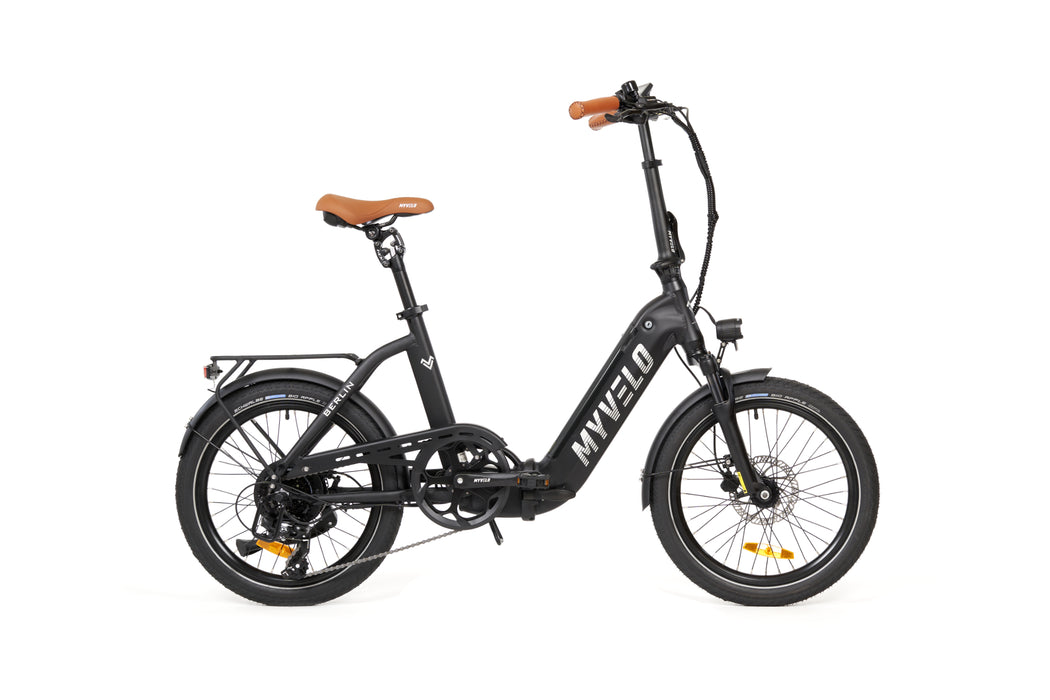
Berlin electric folding bike
incl. FREE shipping & free returns
Pre-order now. Delivery in early 2025

Von Fabian Huber |
5 minutes read time

Every e-bike has a battery and to ensure that it does its job faithfully, a few things need to be taken into account. The cold season in particular can be dangerous for the battery. We have summarized here what needs to be taken into account when caring for the e-bike battery so that the heart of the e-bike continues to do its job faithfully for a long time to come.
For a long time, discharging a battery and then plugging it back into the socket was considered to be rather harmful. Many people still have the so-called memory effect in their ears. This danger is no longer relevant for the lithium-ion batteries that are generally used today.
MYVELO only uses high-quality lithium-ion batteries. Even if the battery is only partially discharged, it will not be damaged if it is put back on the charging station. If you are on a long tour with your bike, you can easily charge the battery during the stops.
The operating manuals usually describe the battery life. However, this information always refers to a full charging cycle. So the specified number is around 1000 e-bike charging cycles.
Batteries are not immune to cold and heat. The ideal temperature range is between 15 and 20 degrees. This ensures the MYVELO battery life. Of course, such temperatures cannot always be maintained when riding. Nevertheless, this information is not unimportant.
If the bike is outside in the winter, the battery should be stored in a warm room during this time . If it is particularly hot in the summer, it is worth storing it in a cooler room to ensure a reliable MYVELO battery life. If you still want to use the bike in the cold winter or hot summer, you should only plug in the battery shortly before the tour.
And there's also a good tip for when you're on the go: With special thermal protection covers for e-bike batteries, cooling down can be delayed and the MYVELO battery life can be ensured even more reliably.
A battery should never be opened alone. To make the batteries pleasantly light, they are extremely compact. Every millimeter of space inside is used. This means that important functions can quickly be destroyed if the battery is opened without professional knowledge.
Batteries are particularly sensitive to high temperatures. For example, if you are out on a nice bike ride in midsummer, it is strongly advised not to leave your bike exposed to sunlight for a long period of time without supervision. The exposure to sunlight increases the risk of fire on an e-bike.
We also advise against cleaning the battery with a water jet. The battery should be removed first, especially if you are going to wash the bike with a garden hose after a ride. High-pressure cleaners are ideal for removing deep-seated dirt, but they are less suitable for the care and handling of e-bikes. If the battery is dirty, it can be carefully cleaned with a cloth.
A number of manufacturers advertise certain battery protection types. In most cases, the marking consists of the abbreviation IP and two numbers. The first number represents the battery's protection against foreign bodies and contact. The second number refers to the sensitivity to moisture.
In some cases, it seems as though the battery is slowly losing power, even though the specified e-bike charging cycles have not yet been reached. In such a case, the best way is to go to a local specialist dealer.
Using a specific diagnostic tool, you can quickly determine the condition of the battery. If the battery is still under warranty, it can be replaced free of charge.
If the battery is damaged, for example after an accident, it should be taken to a specialist dealer immediately. Under certain circumstances, the separating layer may dissolve after the damage and the battery becomes a fire hazard.
The real danger here is a short circuit. Once this occurs, it cannot be stopped because it originates in the power source itself. The battery contains individual cells that are connected to one another. If contact occurs, for example due to a break, a short circuit can occur.
Proper storage is essential for optimal care of your e-bike battery - not only so that it lasts a long time, but also for your own safety. As a general rule, you should store the battery in a dry place protected from moisture.
Batteries of this type are sensitive to extreme temperature fluctuations, so it is also important to store them in a place that is neither too warm nor too cold. A temperature range of 10 to 20 degrees would be ideal.
You should also make sure that you do not overcharge the battery. This can also have a negative impact on the lifespan of your e-bike battery. It is enough to have the battery not completely empty or full.
E-bike batteries should be charged regularly and in specific situations to maximize their lifespan and ensure optimal performance.
If your battery is not completely discharged or charged, that is the optimal state for it. Waiting until it reaches 100 or 0 percent can be harmful to it. Being in the range of 20 to 80 percent is better for it.
It's good to charge the battery after every ride, or at least every few rides, especially if you've been riding longer distances. A good charging range is between 20% and 80% of capacity to maximize battery life.
Rough guidelines that you can follow when charging your battery include: Make sure that you fully charge or discharge your battery as rarely as possible.
When charging the e-bike battery, it is advisable to use the original charging cable to avoid possible compatibility problems. Charge more often and for shorter periods of time rather than less often and for longer periods of time. Make sure that your battery is not exposed to extreme temperature fluctuations.
It is not recommended to run an e-bike battery completely empty. Here are some reasons why:
Battery life : Lithium-ion batteries used in most e-bikes have a limited number of charge cycles. If the battery is regularly fully discharged, this can reduce the number of charge cycles and therefore shorten the battery's lifespan.
Avoid deep discharge : A complete discharge can lead to a deep discharge , where the battery's voltage drops below a critical level. This can permanently damage the battery and reduce its capacity.
Performance drop : When the battery is low, there may be a noticeable drop in performance, reducing motor assistance and affecting the riding experience.
Temperature issues : In cold temperatures, a nearly empty battery can lose capacity more quickly, which can further limit range and performance.
It is advisable to recharge an e-bike's battery regularly and, if possible, not to let it fall below 20-30% of its capacity. It is ideal to keep the battery in the range of 20-80% to maximize its lifespan and ensure consistent performance.